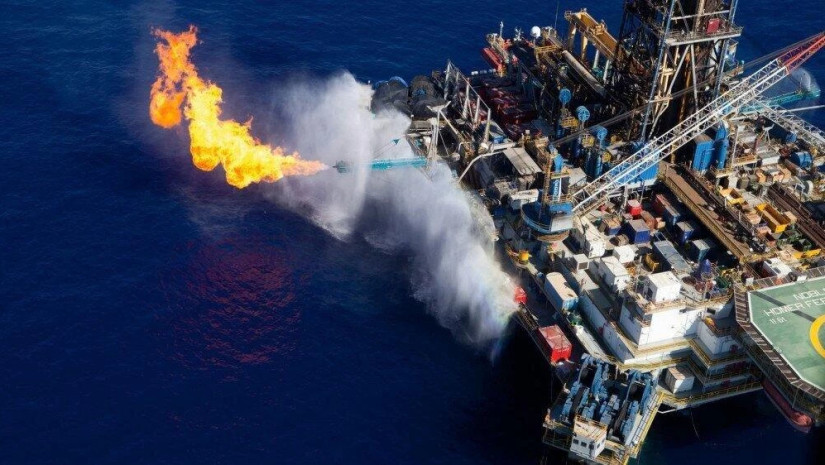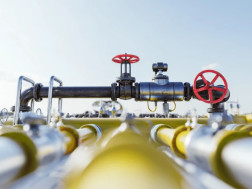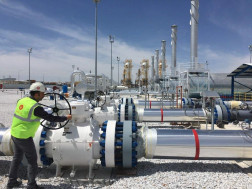President Recep Tayyip Erdoğan expressed Turkey’s interest in resuming talks with Israel on using its natural gas and transporting it to Europe, in remarks that come as the two countries look to improve strained bilateral relations.
Energy cooperation will be discussed during Israeli President Isaac Herzog’s upcoming visit to Turkey, Erdoğan told reporters aboard the presidential plane on his return from a visit to Kyiv, Daily Sabah reports.
Herzog’s is due to visit in mid-March, the president said on Thursday ahead of his trip to Ukraine, stressing that both countries were looking to improve ties.
“We can use Israeli natural gas in our country, and beyond using it, we can also engage in a joint effort on its passage to Europe,” Erdoğan said.
“Now, God willing, these issues will be on our agenda with Mr. Herzog during their visit to Turkey.”
Turkey and Israel had previously attempted to cooperate on energy resources, but those talks had never moved very far.
Erdoğan Wednesday met Kurdistan Regional Government (KRG) President Nechirvan Barzani. Asked what was discussed, he said Ankara wants to sign a natural gas supply deal with Iraq and is holding talks on this.
“We have now taken the Iraq issue on our agenda. We are now thinking about it. There may be a supply on the natural gas side from Iraq to Turkey,” Erdoğan said, adding Barzani had promised to facilitate talks.
The president’s remarks come after the United States last month pulled its support for a subsea pipeline that would carry Israeli gas from the Eastern Mediterranean to Europe via Greek Cyprus and Greece.
Turkey has long opposed the project and has stressed that any scheme that aims to sideline the rights of Turkey and the Turkish Republic of Northern Cyprus (TRNC) in the Eastern Mediterranean will be unsuccessful.
The EastMed project had also enjoyed the support of the former Trump administration in the U.S. However, the Biden administration, in an apparent U-turn, had expressed misgivings about the project, citing concerns over its economic viability and environmental costs.
Erdoğan last month said the U.S. pulled its support because the project makes no economic sense, reiterating his view that such a project “cannot work without Turkey.”
“These studies are not such simple figures, but very serious numbers. Now here, in my opinion, the U.S. withdraw from here because it did not find what it had expected and because it did not find this job financially and economically viable. Otherwise, the U.S. would not have withdrawn from here if it had found the economic outcome,” he said on Friday.
The 1,900-kilometer (1,180-mile) project would initially be expected to carry 10 billion cubic meters of gas a year. But it remains unclear whether the project will ever go ahead.
Under a cooperation deal sealed two years ago, Greece, Greek Cyprus and Israel aim to reach a final investment decision for the pipeline in 2022 and to complete the construction of the 6-billion-euro ($6.82 billion) scheme by 2025.
It would transport gas from Israeli and Greek Cyprus to Greece and into Europe’s gas network via Italy. But regional politics could well scupper such plans.
In recent months, Turkey and Israel have been working on a rapprochement, with Erdoğan, a vocal supporter of the Palestinian cause, having spoken to Herzog and Israeli Prime Minister Naftali Bennett, the first such call in years.
The Turkish president last month said Herzog’s visit could open a new chapter in bilateral relations and that he was “ready to take steps in Israel's direction in all areas, including natural gas.”
Relations between Turkey and Israel hit a low in 2010 following an Israeli naval raid on a Turkish aid ship, the Mavi Marmara, en route to deliver humanitarian aid to the blockaded Gaza Strip. The raid killed 10 activists.
The event caused an unprecedented crisis in Turkish-Israeli relations that had been peaceful for decades. Both countries even recalled their diplomatic envoys following the incident.
In 2013, with Israeli Prime Minister Benjamin Netanyahu's apology to Turkey and the payment of $20 million (about TL 38 million at the time) in compensation to the Mavi Marmara victims, Turkish-Israeli relations entered a period of normalization.
In December 2016, both countries reappointed ambassadors as part of the reconciliation deal and reiterated several times the necessity to further improve bilateral relations.
However, Turkish officials continue to criticize Israel’s policies targeting Palestinians, including the illegal settlements in the occupied West Bank and Jerusalem and the humanitarian situation in Gaza.
Turkish citizens have also been complaining about Israel’s arbitrary restrictions on visits. However, Israel's informal policy of deportation, visa rejection, arbitrary detention and delay of Turkish nationals for no reason at airports has failed to discourage hundreds of visitors each year.
















